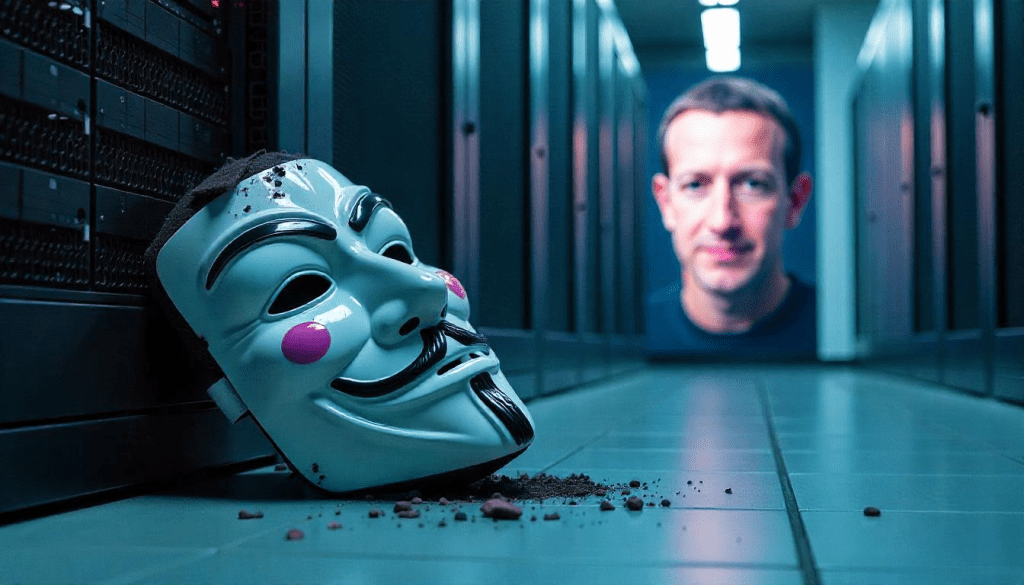In the modern digital age, two entities stand as symbols of contrasting ideals: Anonymous and Mark Zuckerberg. On one side, you have Anonymous, the elusive, decentralized group of hacktivists known for exposing corruption, fighting censorship, and challenging the establishment. On the other, you have Mark Zuckerberg, the founder of Facebook (now Meta), who built one of the most powerful social media empires, shaping how billions of people interact online. Their paths have occasionally clashed, making the conflict between these two forces an intriguing battle between privacy advocates and digital control.

Who is Anonymous?
Anonymous is not a single person but a collective of hackers, activists, and whistleblowers who operate under a common ideology. Their main goal is to fight against government overreach, corporate greed, and internet censorship. They are well-known for their signature Guy Fawkes masks and their ability to launch cyberattacks, expose secrets, and bring attention to social issues.
Some of Anonymous’ most notable actions include:
- Exposing government surveillance programs.
- Taking down websites of oppressive regimes.
- Supporting movements like WikiLeaks, Occupy Wall Street, and Black Lives Matter.
- Targeting corporations accused of unethical practices.
Their activities often spark debates about the ethics of hacktivism and whether cyberattacks are justified forms of protest or dangerous crimes.
Who is Mark Zuckerberg?
Mark Zuckerberg is a billionaire entrepreneur best known as the founder of Facebook, now rebranded as Meta. He started Facebook in 2004, and it has since evolved into one of the most influential social media platforms, owning Instagram, WhatsApp, and Oculus.
Some key aspects of Zuckerberg’s career include:
- Turning Facebook into a global tech giant with billions of users.
- Pioneering social media advertising and data-driven marketing.
- Expanding into the metaverse with Meta’s vision of virtual reality.
- Facing multiple controversies related to data privacy and misinformation.
Despite his success, Zuckerberg has been criticized for his handling of privacy issues, the spread of misinformation, and Meta’s influence over global elections and public opinion.
The Clashes: Anonymous vs Mark Zuckerberg
1. Facebook’s Privacy Issues
One of the biggest reasons Anonymous has targeted Mark Zuckerberg is Facebook’s handling of user data. Over the years, Facebook has been accused of harvesting user information, tracking online behavior, and selling data to advertisers without proper consent.
In 2011, Anonymous released a video threatening to expose Facebook’s privacy violations, accusing the company of profiting from user data. The infamous Cambridge Analytica scandal in 2018, where Facebook allowed a political firm to misuse millions of users’ data, further fueled concerns about digital privacy.
2. Censorship and Content Moderation
Meta (formerly Facebook) has immense control over online speech. The platform has faced criticism for both allowing harmful content to spread and aggressively censoring opposing viewpoints.
Anonymous, which often fights against censorship, has expressed concern over Facebook’s ability to decide what content is visible or removed. They argue that such power in the hands of one company creates a digital dictatorship, where corporations control the flow of information.
3. Facebook’s Role in Manipulating Public Opinion
Facebook’s algorithm prioritizes engagement, which has led to concerns about echo chambers and the spread of fake news. Studies have shown that misinformation spreads rapidly on the platform, influencing elections, public discourse, and even real-world violence.
Anonymous has accused Zuckerberg of prioritizing profits over ethical responsibility, claiming that Facebook’s business model fuels social manipulation rather than meaningful interaction.
4. Surveillance and Government Cooperation
Facebook collects extensive data on its users, from their personal details to their online behaviors. Reports suggest that Facebook has cooperated with government agencies, providing data that could be used for surveillance purposes.
Anonymous has highlighted how Meta’s growing control over virtual reality (VR) and artificial intelligence (AI) could lead to even more invasive forms of data collection in the future. With Meta’s push into the metaverse, concerns about digital privacy are only increasing.
The Bigger Picture: What This Battle Represents
The conflict between Anonymous and Mark Zuckerberg is more than just a personal battle; it represents a larger struggle between privacy advocates and corporate control. It raises important questions:
- Should social media companies have so much control over information and communication?
- Is hacktivism a legitimate form of protest, or does it create more harm than good?
- How do we balance technological innovation with ethical responsibility?
- Who should control online privacy—corporations, governments, or the people?
The Future of the Battle
While Mark Zuckerberg continues to expand Meta’s influence into virtual reality, AI, and beyond, Anonymous remains active, challenging corporations, governments, and unethical institutions. Their methods differ—Zuckerberg uses technology and business strategy to maintain control, while Anonymous uses cyberattacks and public exposure to resist it.
This battle will likely continue as concerns over digital privacy, online censorship, and corporate influence grow. Whether you see Anonymous as heroes or criminals, and Zuckerberg as a visionary or a digital overlord, one thing is clear: the clash between big tech and digital resistance is shaping the future of our world.
Conclusion
The story of Anonymous vs Mark Zuckerberg is not just about one billionaire and one hacker group. It is about the fight for control over the internet, privacy, and information in the digital age. While Zuckerberg represents the power of social media and data-driven business, Anonymous stands for resistance against corporate surveillance and digital manipulation.
As technology continues to evolve, these clashes will likely become even more significant. Whether you support Anonymous, Zuckerberg, or neither, their impact on society cannot be ignored. The real question is: Who should hold power in the digital world—corporations, governments, or the people?
What do you think? Is Anonymous justified in their attacks against Zuckerberg, or is Mark Zuckerberg simply a businessman following the rules of the digital economy? The debate is far from over.